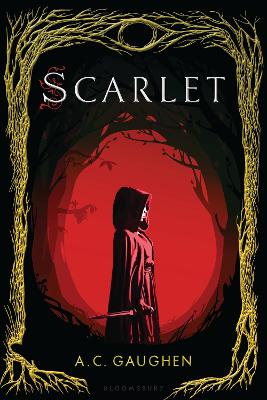Reviewed by Briana @ Pages Unbound on
All is told in a first person narrative from the perspective of Scarlet herself—who thankfully comes right out and admits she is a girl disguising herself as a boy. Most authors using this plot element try to make it a sudden reveal halfway through the novel, which can be frustrating (readers go through the “but are you really the same person?” questioning phase just as much as the characters) and downright cliché. Scarlet is a plucky girl determined to to carve herself a new life, though she is not always certain whether she wants that life to be with Robin’s band. The story is just as much about Scarlet’s search for a home and identity as it is about fighting the injustice of Prince John’s government, which gives it a personal and human aspect not found in many retellings. Annoying, Scarlet relates events in an affected commoner dialect, consistently saying things like, “He were afeared.” Thankfully, no one else speaks like this, so when other characters are introduced and start talking, readers got a break from the horrendous grammar. Of course, this also raises the question of why Scarlet speaks like this at all. Where did she pick it up, if no other person, other commoners included, ever talks like that? Readers may never know.
Gaughen also adds a swoon-worthy romance to her tale, which will leave readers hungry for more of the action and romantic dialogue in the sequel. There is an attempt at a love triangle, but it has a rather obvious outcome, due to the characterization of the two men in question. Even so, both men appear to have a decent shot at winning over the girl, at least for a while, so the love triangle does manage to add at least of bit of tension to the book. Basically, readers know how everything must end, but Scarlet herself appears legitimately torn and both men have enough good characteristics that her attraction to both believable.
The action plot also has a few obvious twists, but they are interesting enough and Gaughen writes well enough that the story is still fun to read, even if readers can hazard a few good guesses at what will happen. In general, this is the sign of a good writer. As I have mentioned before on the blog, one of my English professors was fond of commenting, “No one rereads books for plot.” So if readers can know what happens and still want to keep reading, there must be something really enjoyable or interesting going on.
And there is. Gaughen takes advantage of the inherent question of the Robin Hood story: What is moral? Is it right to steal from the rich to give to the poor? Is it just a lesser evil to steal and help people survive than to watch them starve to death? Did Robin have any other options? When threatened, should he turn himself in to the sheriff, or will he ultimately save more lives by continuing to live and give the people money? I am not sure any Robin Hood tale gives a concrete answer to all or even most of these questions, but a good version explores them instead of assuming This is just how the story goes. The characters should talk about them, and the readers should be lead to think about them. Gaughen adds further moral ambiguity with some aspects of the romance plot. Normally, I am all for characters following the straight and narrow in their romantic endeavors (I cannot, for example, really enjoy any book where the main romance is adulterous, like Water for Elephants), but the ambiguity seems so natural and necessary to a story like Scarlet. I am looking forward to seeing how it plays out.
Robin Hood retellings, in my opinion, can get old. They often seem so similar, in ways that retellings of other stories usually do not. Cinderella, for example, has become a modern day waitress, a futuristic Japanese cyborg, a girl in a fantasy land who literally must obey any order given. Robin Hood, barring a few exceptions, is always a man in Lincoln green living in Sherwood forest. There are only so many changes an author can make to that tale. Gaughen, however, has taken that story and made it seem new. Instead of focusing on the action (though there is plenty), she highlights deeper aspects of the legend—the morality, the relationship among the band members, the search for an identity and a home when you are a criminal living in the woods—and she gives these aspects a unique voice, that of a tough girl who apparently knows no grammar.
Reading updates
- Started reading
- 16 June, 2013: Finished reading
- 16 June, 2013: Reviewed
